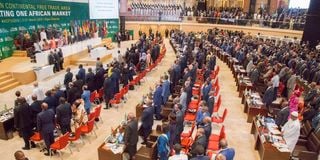Premium
Time to cede loyalty to supranational African ideals

African delegates during an African Continental Free Trade Area (AfCFTA) meeting in Kigali, Rwanda on March 21, 2018. Studies show the full implementation of the AfCFTA would increase intra-African trade by 52 percent or by $450 billion by 2035, according to the World Bank.
The desire and enthusiasm for integration in Africa has never waned as a rationale for the enhancement of our economic growth and development as well as achieving Agenda 2063 of the African Union.
However, despite many efforts across different regional political and economic groupings around the continent, much remains to be achieved.
Africa is considered to have the highest concentration of sub-regional economic organisations that promote integration but, today, the continent has remained the least integrated among the globe’s key regions.
The stark truth is that Africa is yet to reap the full benefits of economic integration and a lot more effort needs to be done to mobilise the necessary political goodwill to hasten it.
The colonial history of Africa has, for decades, defined the form and shape the journey towards continental integration has taken.
Nearly all economic blocs were founded on regionalism and similarity of colonial background; from the Southern Africa Development Community (SADC), East African Community (EAC), Economic Community of West African States (Ecowas) to the Community of Sahelian Countries (Censad) and the Arab Maghreb Union.
While the regional blocs have, over years, promoted good relations among African countries, the integration process on the continent has been hindered largely by inadequate infrastructure -- both within and among countries -- political instability in some cases, lack of requisite support institutions, and disruptions in regions where member states sometimes experience wars.
At the formation of the African Union (AU) from the Organisation of African Union (OAU) in 2002, the eight main regional economic blocs at the time were originally envisaged to form the building blocks of an ultimate Union Government and the United States of Africa.
This ambition has remained a mirage, perhaps due to the fact that most African countries are still comparatively young.
For most, having acquired independence in the 1960s, the concept of sovereignty is still closely associated with the preservation of national identity.
For Africa to stay the course of political and economic integration, and with the recent diminishing appetite for multilateralism, especially in international trade and geopolitical tensions around the world, there are two critical areas that are work in progress but, in my view, are low-hanging fruits that merit more focused attention.
One, there is evidence that deepened trade and economic integration is a strong building block for monetary and eventual political integration.
The European Union, for example, is built upon that premise.
Africa must push hard on the boundaries of its internal trade by bringing down both tariff and non-tariff barriers.
The African Continental Free Trade Area (AfCFTA) was birthed at a crucial time when the continent was characterised by endemic poverty levels and socioeconomic hardships arising from the Covid-19 pandemic and its related financial, climatic and food crisis.
We have little choice but to double our energies and get the AfCFTA working relentlessly towards enhancing intra-Africa trade and hasten the journey towards a single African market and the world’s largest free trade area.
This would mean a single market of more than a billion consumers with a combined GDP of over $3 trillion.
Studies show the full implementation of the AfCFTA would increase intra-African trade by 52 percent or by $450 billion by 2035, according to the World Bank.
To achieve this will require implementation of coherent and efficient policies at national, regional and continental levels, which are specifically focused on promotion of intra-African trade.
Two, Africans have handled multiple currencies for all the classical four functions of money for at least a thousand years.
Africa is replete with currencies, most characterised by their illiquid and barely tradable status in the global marketplace.
More than 80 percent of the continent’s cross-border payment transactions through African banks have to be routed abroad for clearing and settlement, thereby leading to an annual $5 billion haemorrhage on transaction costs alone.
In addition, we have recently witnessed dollar shortages in some African countries, which make trading for such countries difficult and unpredictable.
The efforts by the Afreximbank and the AfCFTA to establish the Pan African Payment and Settlement System (Papss) is a commendable step towards not just reducing transaction costs and delays, more importantly, laying the foundation for an African Monetary Union.
The Papss facilitates instant cross-border payments in local currencies between countries.
More importantly, the platform eliminates the burden of sourcing hard currencies to support transactions and enhances the role of African currencies.
This is a complimentary effort as Africa pursues a single currency to facilitate trade within the continent.
Finally, the realisation of a fully implemented AfCFTA with an intra-African trade at over 50 percent and a Pan African Payment Settlement System that fully facilitates ease of payment for goods and services across the continent is within reach.
However, this will only be possible if member states can be persuaded to cede commensurate loyalty to the ideals of supranational authority and the long-term benefits of integration.
For integration to deepen, this should be a matter of serious conversation among the member states if our safari remains influenced by the pan-African desires for collective self-reliance, solidarity, development, peace and unity.
Raila Odinga, a former Prime Minister of Kenya, is a candidate for the AUC chairmanship.





